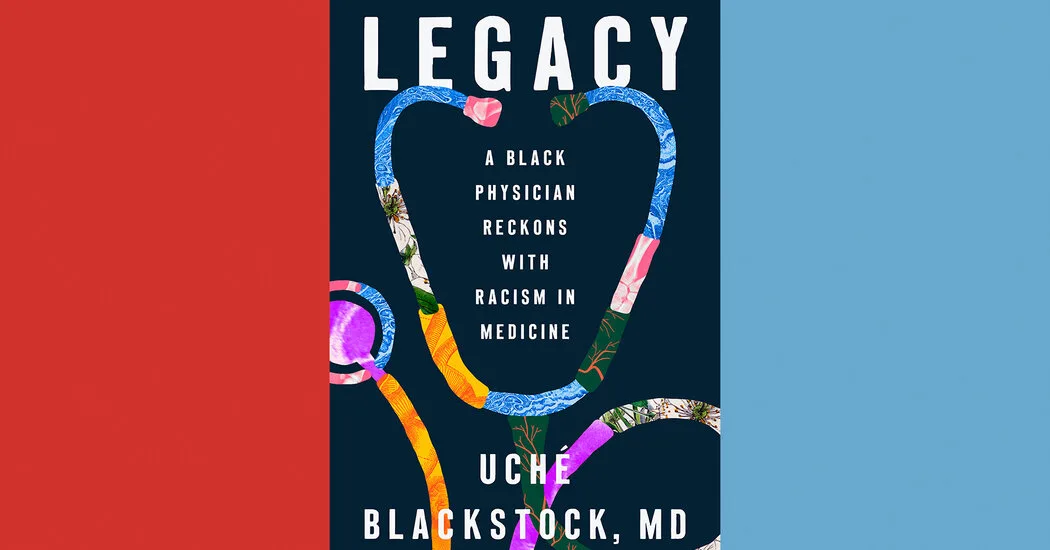
In “Legacy,” Dr. Uché Blackstock writes about losing her pioneering physician mother and the pervasive health woes of Black Americans.
LEGACY: A Black Physician Reckons With Racism in Medicine, by Uché Blackstock
As children, Uché Blackstock and her twin sister, Oni, delighted in riffling through their mother, Dale’s, doctor’s bag, both at home and when they visited her at the Brooklyn hospital where she was a kidney specialist.
Dale had overcome severe childhood poverty on her path to Harvard Medical School; her daughters idolized her, and planned on becoming doctors themselves.
Dale’s triumphant story took a tragic turn when Dale was diagnosed with acute leukemia and died at age 47. Despite near-paralyzing grief, Uché and Oni persevered; in 2005, the Blackstocks became the first Black mother-daughter graduates of Harvard Medical School, a bittersweet legacy of personal success in a world where Black struggle surrounded them.
It is this other legacy — deeply rooted in American racism and its deleterious health effects — that Uché Blackstock mines as she recounts her racial awakening as a medical student and physician.
During medical school, she was taught, as was I, to see the world through a “scientific, objective and evidence-based lens.” Yet there was no mention of how state-enforced segregation — which many Black patients had lived through — could have adversely affected their health. Nor did we learn the names now synonymous with medical racism: the Tuskegee syphilis study, Dr. J. Marion Sims, Henrietta Lacks. Instead, we were told, in a matter-of-fact way, that many Black people didn’t trust medicine, as if the fault was mainly theirs and not ours.
This past is relevant today. Pregnancy and childbirth remain stubbornly dangerous undertakings for Black women. The Covid-19 pandemic revealed large disparities in treatment based on insurance status, which disproportionately harmed Black patients.
Blackstock, trained as an emergency physician, describes the stark contrasts she witnessed in a private New York City emergency room and a public one nearby, indicting the medical center where she worked for operating a system of “segregated care.” This parallels my own experience, and those of many other physicians who have worked in similar settings across America.
When Blackstock joined the faculty of N.Y.U. in 2010, she hoped she could change the system from within. She developed an area of clinical and research focus (ultrasound technology), taught residents and mentored students. Eventually, she took a leadership role in the hospital’s diversity affairs office. But she felt stymied in her efforts to candidly address medical racism, and when she applied for a promotion, was initially rejected. In 2019, she founded a company focused on health equity.
Today, Blackstock is an MSNBC contributor prominent on social media. Unconstrained by academic medicine, she speaks on subjects beyond the world of doctors and hospitals, ones she asserts are vital to making real progress toward health equity. In her final chapter, she delivers a call to action, urging governments to aid Black people in the realms of housing policy, education, job creation and police and criminal justice reform.
Many see these as necessary goals. But given our country’s intractably deadlocked politics, it’s extremely difficult to imagine that they can ever be implemented on a large scale. And while Blackstock has gained traction in her own work outside the traditional medical system, her messaging for doctors remaining within it is less clear, and perhaps even discouraging, given her own experiences.
Ultimately, “Legacy”’s greatest contribution is in bringing this extraordinary family story to light — as much a part of the American fabric as those of our default narratives of success.
In what may be the book’s most affecting passage, Uché, then a grief-stricken college student, asks her terminally ill mother, “What are some things that I should know for the future, things that we won’t be able to talk about later?” Dale urges her to take care of herself as she pursues her dreams.
Three decades later, Uché and Oni — now mothers themselves — have inherited the doctor’s bag they played with as kids, and they are “running with it.”
LEGACY: A Black Physician Reckons With Racism in Medicine | By Uché Blackstock | Viking | 294 pp. | $28

